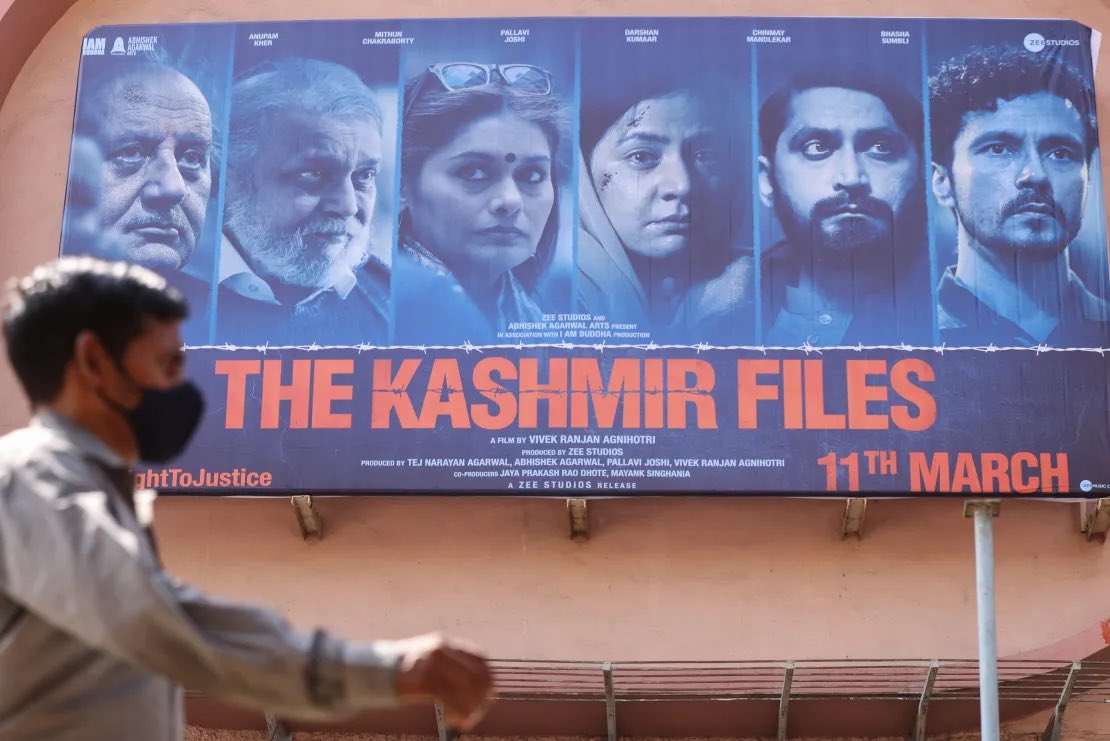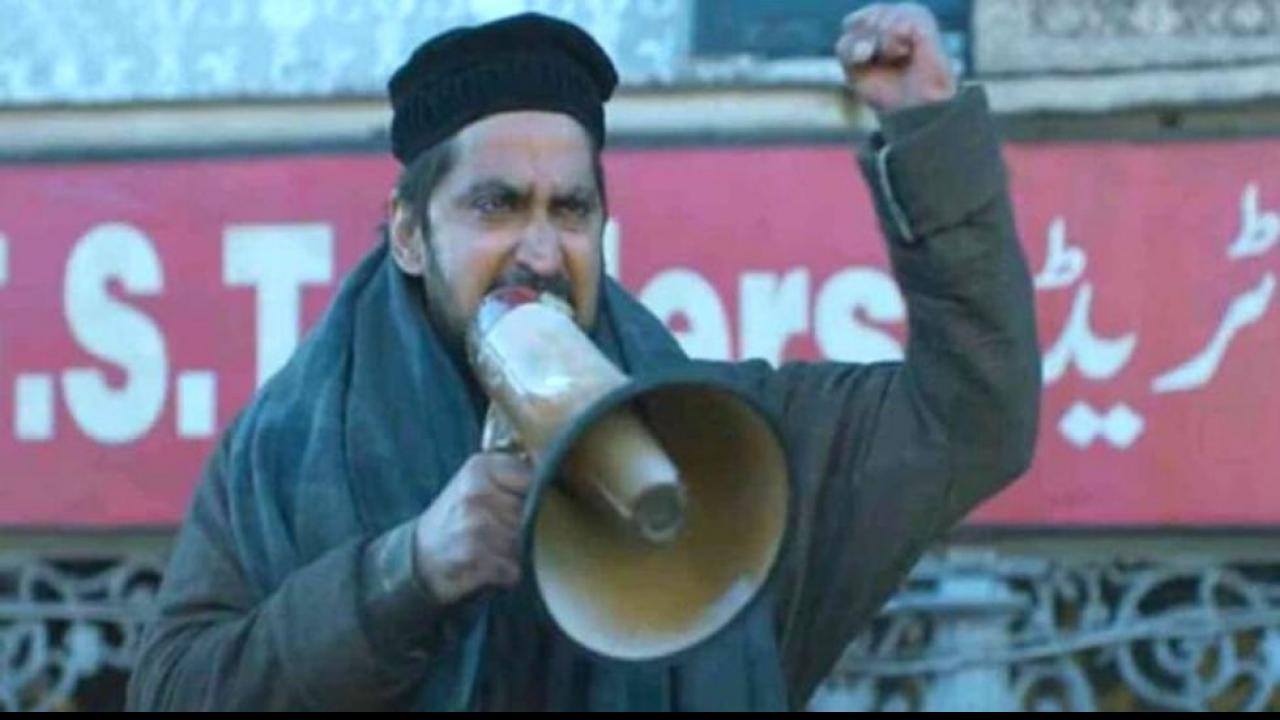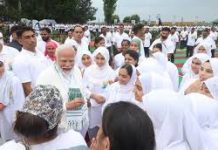
The film which showcases the exodus of Kashmiri Pandits gives a distorted and factually inaccurate trajectory of events even as it tries to paint Muslims as a community to be savage and cruel
When celebrated poet Faiz Ahmed Faiz wrote the famous Hum Dekhenge and singer Iqbal Bano immortalized it through her soul stirring rendition to a packed hall in Lahore, little did they know that one day the lines would be part of the Indian celluloid not only in a different context but in a manner that is contrary to its original intent.
It was in the winter of 1979 that Faiz wrote Hum Dekhnege, against General Zia-ul-Haq’s dictatorial regime. Six years down the line, when Iqbal Bano sang it to a full house, it was also in protest. General Zia had prohibited women from wearing a saree because he deemed it to be un-Islamic. A defiant Iqbal Bano not only sang but did so, clad in a saree: the attire that Pakistan’s then President General Zia had banned. If reports are to be believed the legendary singer wore a black saree: the colour of protest. The words come alive even today, in different contexts though:
Hum dekehnge
Laazim hai ki ham bhi dekhenge
Hum dekhenge
Woh din ke jiska wada hai
Jo lohe azal mein likha hai
Hum dekhenge
Lazim hai ki hum bhi dekhenge
Hum dekhenge
(We will see/It is inevitable that we too shall see/we will see/The day that is promised/the one that is written on the tablet of Eternity/we will see…)
Almost half a century later, the lines have been juxtaposed in an entirely different context: rather than attacking dictatorial regimes they are pitching one community against another, namely Hindus versus Muslims. To say that this is a deliberate attempt to reduce the iconic protest anthem to a communal chant would be an understatement. That Faiz Ahmed Faiz would be turning in his grave is also a given.
But does the India governed by Prime Minister Narendra Modi really care? It actually does not because in BJP’s India, communalism and nationalism go hand in hand.
In the saffron Party’s scheme of things, one is a true Indian if one is a good Hindu. And it does not stop there because a BJP Hindu must necessarily be one who considers Muslims as outsiders.
This seems to be the recurrent theme since the BJP took power at the Center in 2014 under the leadership of Prime Minister Modi. And it is one that has played out at regular intervals sometimes rising as a demon to swallow the weak.
But back to Faiz, his protest anthem and its misuse on this side of the border.
In recent times, in 2019 to be precise, it was heard during the Citizenship Amendment Act or CAA protests that followed the Government’s decision to relax the rules of acquiring citizenship to illegal immigrants.
The Muslims took to the streets because it excluded them from the purview of this law while including Hindu, Sikh, Jain, Buddhist, Parsi and Christian communities who had entered India before 2014 to escape religious persecution. It was during these protests that “Hum Dekhenge” was sung on the streets, in colleges and universities, the Jawaharlal Nehru University or JNU being one such which saw violence against students by an armed mob.
Two years down the line, the protest anthem has resurfaced. The setting is familiar but the timeline has been mixed up. As also the context.
This time around it is the theme song of the highly controversial film The Kashmir Files.
Picturized in the JNU, it is used as a backdrop to hammer divisiveness and pitch the battered Kashmiri pandits against tyrannical Muslims.
In the film, the revolutionary song is being sung by students as a freedom song for Kashmir with slogans of azaadi, azaadi liberally thrown in.
Of course the filmmaker has used, rather misused, cinematic license to cut and paste the present and transport it to an era gone by: in other words used the 2019 event in the context of 1990.
The CAA protests happened in 2019; the JNU violence in January 2020 which is when Hum Dekhenge kept the protests alive. The film, set in 1990, uses it against the backdrop of terrorism and insurgency: turning the entire context on its head.
So what is the film about and why is it so controversial?
A one line answer would be: The Kashmir Files showcases the exodus of Kashmiri Pandits from the valley which the film makers prefer to flag as genocide; it is controversial because it pedals half-truth and gives a distorted and factually inaccurate trajectory of events.
However, this does not undermine the directorial finesse’, powerful portrayals and the gripping narrative of the nearly three hour exercise. Of course there are gory visuals which could have been handled more subtly but then one could argue: what is horror without horror? Or the logic of toning it down?.
Therefore on its own, the film stands out and as filmmaker Ram Gopal Varma said: “Bollywood will be permanently divided into two eras as pre Kashmir files Bollywood and post Kashmir Files Bollywood. I want to touch the feet of @Vivek Agnihotri…for breaking the foundation of Bollywood so as to build a brand new Bollywood”.
If this is about film making then Varma is bang on but if it is about a new Bollywood then one needs to stop and think on how the “new Bollywood” that Varma talks about will shape up?
Will it be a narrative to cash in on wounds, push an irreparable divide and pitch Hindus and Muslims against each other? Will the new Bollywood follow a political agenda? Will it make creativity subservient to those in power?
Communal chants during the screening of The Kashmir Files lends credence to the fact that unity was the biggest casualty here. Add to this, anti-Muslim slogans and calls to stay away from Muslims and the picture of Hate is complete. However, many Kashmiri Pandits are on record to caution people against falling prey to anti-Muslim propaganda.

However, while Varma is busy touching Agnihotri’s feet and applauding him for making a film that tears both society and psyche apart, it is time to reflect on the content of the film which is, both, disturbing and distorted. It is disturbing because it magnifies and brutally markets tragedy; and distorted because it has deliberately glossed over facts to flag fiction.
It is no one’s case that Kashmiri Pandits did not suffer. But the issue is: whether they were the only ones; whether it was a Hindu versus Muslims; or as well-known politician Sitaram Yechury said Indians pitched against terrorists?.
And it is this that every right minded Indian worth his salt must answer and address because to sensationalize is easy but to gather the fragments of the aftermath of such an exercise indeed is very, very difficult, arduous and painful. The filmmakers are laughing their way to the bank but at what cost?
The crux of the issue is pedalling half-truths. The onus is not solely on the film makers who have deftly used their craft and technique to achieve this. It is also on those who are guilty of ignoring Kashmiri Pandits when their lives turned upside down and brushing it under the carpet. Quite like the makers of The Kashmir Files who decided not to present the complete picture which is displacement and hardship of other communities including the Muslims.
Instead they distorted the tragedy to showcase Muslims as a community to be savage, cruel and blood thirsty. They are projected to be devils baying for Hindu blood. And it is this distortion that threatens to rip apart the delicate social fabric of India: an India which is being pushed to the brink of becoming Hindustan and taking away the Indian from the essence of the nation and reducing him to be a Hindu or a Muslim.
One cannot and should not argue that the Kashmiri Pandits ordeal should not be shown but whether it should be exaggerated the way it has been in the film puts a question mark on the credibility of those who are accused of pushing an agenda: an agenda of divisiveness, of creating a communal wedge, of blood and bullets and worse still of dirty politics.
And this is where the BJP and unfortunately the government comes in. It is none other than Prime Minister Narendra Modi who took the lead in endorsing, rather advertising, The Kashmir Files as Yechury recently said.
Heaping lavish praise on the film, Prime Minister Modi said that the “truth that has been suppressed for so long” has finally come out. The issue, Modi said, is not about a film, but “presenting history in its correct perspective”.
And if Modi speaks can others be far behind?. True to their grain, leaders queued up to extol their people to watch The Kashmir Files. If Assam Chief Minister Himanta Biswa Sarma took his entire Cabinet to watch the film, Madhya Pradesh Home Minister gave special leave to cops to watch the film.
It did not stop here. The state governments under the BJP made the film tax free including Karnataka, Assam, Madhya Pradesh among others.
That apart there are reports of the Indian High Commissioner to New Zealand going that extra mile to pitch for the film. He actually wrote to the Chief Censor of New Zealand asking him to take a “fair and balanced view” following his decision to re-evaluate the certificate issued to The Kashmir Files.
The move is perhaps unprecedented given that diplomats intervening for a film is unheard of.
So what does this say about the government and the BJP? Or it using a film as a tool for propaganda?
Of course Agnihotri and company, actor Anupam Kher included, have been equal partners in crime. Kher’s pro-BJP leanings are no secret. Reports have it that he has bent over backwards to curry favour with those who matter both in the Government and the Party. The Kashmir Files merely fit into this game-plan and the entire BJP clan is, now, eating out of his hands. Alongside, the film makers have benefitted: apart from raking in crores, director Vivek Agnihotri is now a household name.
However, the accountability rests with the ruling Party; the onus of cementing communities rests on its shoulders and therefore it is incumbent upon it that it unites rather than divides.
But this goes against its grain as well as its politics.
The BJP thrives on divisive politics and its brand of Hindutva and is willing to use every opportunity to push its communal agenda. Therefore its backing, promoting and actually endorsing the film fits in.
The BJP would do what it takes to create a vertical divide between Hindus and Muslims. The Kashmir Files does exactly that and even while bringing to the fore the sufferings of the Kashmiri Pandits hammers that it is the Muslims who are the villains. The sum total as someone aptly put it: “One goes in to see the movie as an Indian but comes out as a Hindu or a Muslim”.













